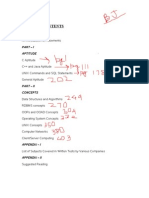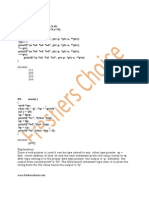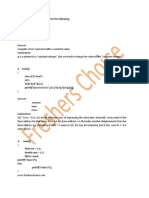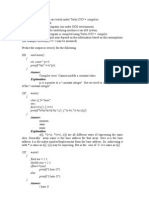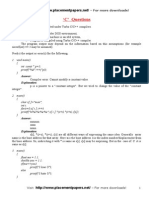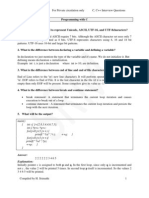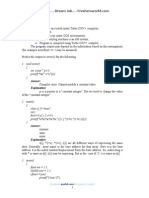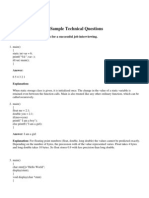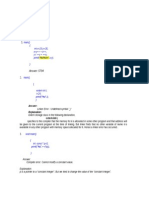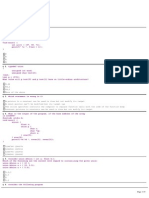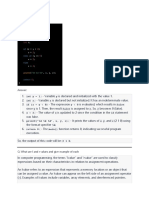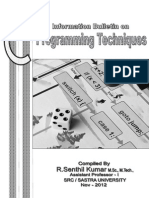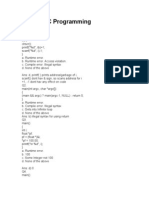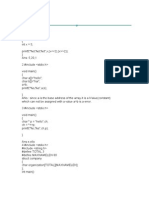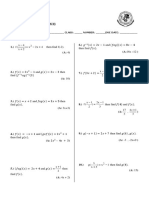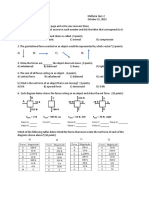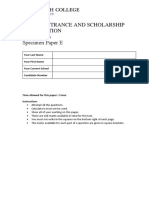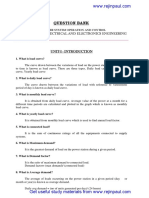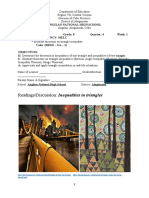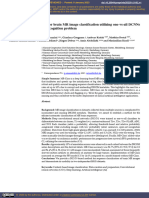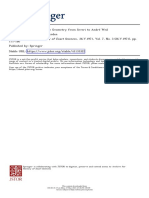main() { extern int i; i=20; printf("%d",sizeof(i)); } Answer: Linker error: undefined symbol '_i'.
Explanation: extern declaration specifies that the variable i is defined somewhere else. The compiler passes the external variable to be resolved by the linker. So compiler doesn't find an error. During linking the linker searches for the definition of i. Since it is not found the linker flags an error. 44) main() { printf("%d", out); } int out=100; Answer: Compiler error: undefined symbol out in function main. Explanation: The rule is that a variable is available for use from the point of declaration. Even though a is a global variable, it is not available for main. Hence an error. main() { extern out; printf("%d", out); } Answer: 100 Explanation: This is the correct way of writing the previous program. int out=100; 46) main() { show(); }
45)
�47)
void show() { printf("I'm the greatest"); } Answer: Compier error: Type mismatch in redeclaration of show. Explanation: When the compiler sees the function show it doesn't know anything about it. So the default return type (ie, int) is assumed. But when compiler sees the actual definition of show mismatch occurs since it is declared as void. Hence the error. The solutions are as follows: 1. declare void show() in main() . 2. define show() before main(). 3. declare extern void show() before the use of show(). main( ) { int a[2][3][2] = {{{2,4},{7,8},{3,4}},{{2,2},{2,3},{3,4}}}; printf(%u %u %u %d \n,a,*a,**a,***a); printf(%u %u %u %d \n,a+1,*a+1,**a+1,***a+1); } Answer: 100, 100, 100, 2 114, 104, 102, 3 Explanation: The given array is a 3-D one. It can also be viewed as a 1-D array.
100 102 104 106 108 110 112 114 116 118 120 122
�thus, for the first printf statement a, *a, **a give address of first element . since the indirection ***a gives the value. Hence, the first line of the output. for the second printf a+1 increases in the third dimension thus points to value at 114, *a+1 increments in second dimension thus points to 104, **a +1 increments the first dimension thus points to 102 and ***a+1 first gets the value at first location and then increments it by 1. Hence, the output. 48) main( ) { int a[ ] = {10,20,30,40,50},j,*p; for(j=0; j<5; j++) { printf(%d ,*a); a++; } p = a; for(j=0; j<5; j++) { printf(%d ,*p); p++; } } Answer: Compiler error: lvalue required. Explanation:
�Error is in line with statement a++. The operand must be an lvalue and may be of any of scalar type for the any operator, array name only when subscripted is an lvalue. Simply array name is a nonmodifiable lvalue. 49) main( ) { static int a[ ] = {0,1,2,3,4}; int *p[ ] = {a,a+1,a+2,a+3,a+4}; int **ptr = p; ptr++; printf(\n %d %d %d, ptr-p, *ptr-a, **ptr); *ptr++; printf(\n %d %d %d, ptr-p, *ptr-a, **ptr); *++ptr; printf(\n %d %d %d, ptr-p, *ptr-a, **ptr); ++*ptr; printf(\n %d %d %d, ptr-p, *ptr-a, **ptr); } Answer: 111 222 333 344 Explanation: Let us consider the array and the two pointers with some address
�a 0 100 1 102 2 104 3 106 4 108 p 100 102 104 106 108
1000 1002 1004 1006 1008 ptr 1000 2000 After execution of the instruction ptr++ value in ptr becomes 1002, if scaling factor for integer is 2 bytes. Now ptr p is value in ptr starting location of array p, (1002 1000) / (scaling factor) = 1, *ptr a = value at address pointed by ptr starting value of array a, 1002 has a value 102 so the value is (102 100)/(scaling factor) = 1, **ptr is the value stored in the location pointed by the pointer of ptr = value pointed by value pointed by 1002 = value pointed by 102 = 1. Hence the output of the firs printf is 1, 1, 1. After execution of *ptr++ increments value of the value in ptr by scaling factor, so it becomes1004. Hence, the outputs for the second printf are ptr p = 2, *ptr a = 2, **ptr = 2. After execution of *++ptr increments value of the value in ptr by scaling factor, so it becomes1004. Hence, the outputs for the third printf are ptr p = 3, *ptr a = 3, **ptr = 3. After execution of ++*ptr value in ptr remains the same, the value pointed by the value is incremented by the scaling factor. So the value in array p at location 1006 changes from 106 10 108,. Hence, the outputs for the fourth printf are ptr p = 1006 1000 = 3, *ptr a = 108 100 = 4, **ptr = 4. main( ) { char *q; int j;
50)
�for (j=0; j<3; j++) scanf(%s ,(q+j)); for (j=0; j<3; j++) printf(%c ,*(q+j)); for (j=0; j<3; j++) printf(%s ,(q+j)); } Explanation: Here we have only one pointer to type char and since we take input in the same pointer thus we keep writing over in the same location, each time shifting the pointer value by 1. Suppose the inputs are MOUSE, TRACK and VIRTUAL. Then for the first input suppose the pointer starts at location 100 then the input one is stored as M O U S E \0
When the second input is given the pointer is incremented as j value becomes 1, so the input is filled in memory starting from 101. M T R A C K \0 The third input starts filling from the location 102 M T V I R T U A L \0
This is the final value stored . The first printf prints the values at the position q, q+1 and q+2 = MTV The second printf prints three strings starting from locations q, q+1, q+2 i.e MTVIRTUAL, TVIRTUAL and VIRTUAL. 54) int i,j; for(i=0;i<=10;i++) { j+=5; assert(i<5); }
�Answer: Runtime error: Abnormal program termination. assert failed (i<5), <file name>,<line number> Explanation: asserts are used during debugging to make sure that certain conditions are satisfied. If assertion fails, the program will terminate reporting the same. After debugging use, #undef NDEBUG and this will disable all the assertions from the source code. Assertion is a good debugging tool to make use of. 55) main() { int i=-1; +i; printf("i = %d, +i = %d \n",i,+i); } Answer: i = -1, +i = -1 Explanation: Unary + is the only dummy operator in C. Where-ever it comes you can just ignore it just because it has no effect in the expressions (hence the name dummy operator). 56) What are the files which are automatically opened when a C file is executed? Answer: stdin, stdout, stderr (standard input,standard output,standard error). 57) what will be the position of the file marker? a: fseek(ptr,0,SEEK_SET); b: fseek(ptr,0,SEEK_CUR); Answer : a: The SEEK_SET sets the file position marker to the starting of the file. b: The SEEK_CUR sets the file position marker to the current position of the file.
59)
What is the problem with the following code segment? while ((fgets(receiving array,50,file_ptr)) != EOF) ;
�Answer & Explanation: fgets returns a pointer. So the correct end of file check is checking for != NULL. 61) main() { char *cptr,c; void *vptr,v; c=10; v=0; cptr=&c; vptr=&v; printf("%c%v",c,v); } Answer: Compiler error (at line number 4): size of v is Unknown. Explanation: You can create a variable of type void * but not of type void, since void is an empty type. In the second line you are creating variable vptr of type void * and v of type void hence an error 62) main() { char *str1="abcd"; char str2[]="abcd"; printf("%d %d %d",sizeof(str1),sizeof(str2),sizeof("abcd")); } Answer: 255 Explanation: In first sizeof, str1 is a character pointer so it gives you the size of the pointer variable. In second sizeof the name str2 indicates the name of the array whose size is 5 (including the '\0' termination character). The third sizeof is similar to the second one. 63) main() { char not; not=!2; printf("%d",not); } Answer: 0 Explanation: ! is a logical operator. In C the value 0 is considered to be the boolean value FALSE, and any non-zero value is considered to be the boolean value TRUE. Here 2 is a non-zero value so TRUE. !TRUE is FALSE (0) so it prints 0.
�64)
70)
#define FALSE -1 #define TRUE 1 #define NULL 0 main() { if(NULL) puts("NULL"); else if(FALSE) puts("TRUE"); else puts("FALSE"); } Answer: TRUE Explanation: The input program to the compiler after processing by the preprocessor is, main(){ if(0) puts("NULL"); else if(-1) puts("TRUE"); else puts("FALSE"); } Preprocessor doesn't replace the values given inside the double quotes. The check by if condition is boolean value false so it goes to else. In second if -1 is boolean value true hence "TRUE" is printed. main() { int i=-1; -i; printf("i = %d, -i = %d \n",i,-i); } Answer: i = -1, -i = 1 Explanation: -i is executed and this execution doesn't affect the value of i. In printf first you just print the value of i. After that the value of the expression -i = -(-1) is printed. #include<stdio.h> main()
�{ int a[2][2][2] = { {10,2,3,4}, {5,6,7,8} }; int *p,*q; p=&a[2][2][2]; *q=***a; printf("%d..%d",*p,*q); } Answer: garbagevalue..1 Explanation: p=&a[2][2][2] you declare only two 2D arrays. but you are trying to access the third 2D(which you are not declared) it will print garbage values. *q=***a starting address of a is assigned integer pointer. now q is pointing to starting address of a.if you print *q meAnswer:it will print first element of 3D array. 74) main() { int i=5,j=6,z; printf("%d",i+++j); } Answer: 11 Explanation: the expression i+++j is treated as (i++ + j) main() { int i=_l_abc(10); printf("%d\n",--i); } int _l_abc(int i) { return(i++); } Answer: 9 Explanation: return(i++) it will first return i and then increments. i.e. 10 will be returned. main() { char *p; int *q;
78)
79)
�86)
long *r; p=q=r=0; p++; q++; r++; printf("%p...%p...%p",p,q,r); } Answer: 0001...0002...0004 Explanation: ++ operator when applied to pointers increments address according to their corresponding data-types. # include<stdio.h> aaa() { printf("hi"); } bbb(){ printf("hello"); } ccc(){ printf("bye"); } main() { int (*ptr[3])(); ptr[0]=aaa; ptr[1]=bbb; ptr[2]=ccc; ptr[2](); } Answer: bye Explanation: ptr is array of pointers to functions of return type int.ptr[0] is assigned to address of the function aaa. Similarly ptr[1] and ptr[2] for bbb and ccc respectively. ptr[2]() is in effect of writing ccc(), since ptr[2] points to ccc. main() { int i =0;j=0; if(i && j++) printf("%d..%d",i++,j); printf("%d..%d,i,j);
�88)
} Answer: 0..0 Explanation: The value of i is 0. Since this information is enough to determine the truth value of the boolean expression. So the statement following the if statement is not executed. The values of i and j remain unchanged and get printed. int i; main(){ int t; for ( t=4;scanf("%d",&i)-t;printf("%d\n",i)) printf("%d--",t--); } // If the inputs are 0,1,2,3 find the o/p Answer: 4--0 3--1 2--2 Explanation: Let us assume some x= scanf("%d",&i)-t the values during execution will be, t i x 4 0 -4 3 1 -2 2 2 0 main(){ int a= 0;int b = 20;char x =1;char y =10; if(a,b,x,y) printf("hello"); } Answer: hello Explanation: The comma operator has associativity from left to right. Only the rightmost value is returned and the other values are evaluated and ignored. Thus the value of last variable y is returned to check in if. Since it is a non zero value if becomes true so, "hello" will be printed.
89)
�90)
main(){ unsigned int i; for(i=1;i>-2;i--) printf("c aptitude"); } Explanation: i is an unsigned integer. It is compared with a signed value. Since the both types doesn't match, signed is promoted to unsigned value. The unsigned equivalent of -2 is a huge value so condition becomes false and control comes out of the loop. What are the following notations of defining functions known as? i. int abc(int a,float b) { /* some code */ } ii. int abc(a,b) int a; float b; { /* some code*/ } Answer: i. ANSI C notation ii. Kernighan & Ritche notation main() { char *p; p="%d\n"; p++; p++; printf(p-2,300); } Answer: 300 Explanation: The pointer points to % since it is incremented twice and again decremented by 2, it points to '%d\n' and 300 is printed.
92)
93)




